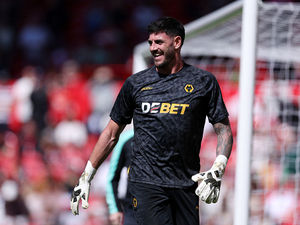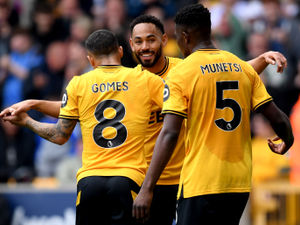Former Wolves defender Ryan Green on how lifestyle held him back
It’s early on a Friday evening and former Wolves defender Ryan Green, once Wales’ youngest international, is enroute to a coaching session for young players at Ross Juniors FC in Herefordshire.
It’s only a few months ago that the 42-year-old, most recently with Westfields in the Hellenic Football League Premier Division, actually hung up his boots from playing.
And he hasn’t completely ruled out the prospect of coming out of retirement.
For now though, he is enjoying the coaching, alongside other work with vulnerable youngsters across Bristol and South Wales, not to mention a busy family life with wife Hannah and young daughters Olivia, three, and Alexia, 1.
Times have certainly changed.
Back in the day, Green’s Friday nights looked very different. And his Saturdays, probably his Sundays, and many more besides.
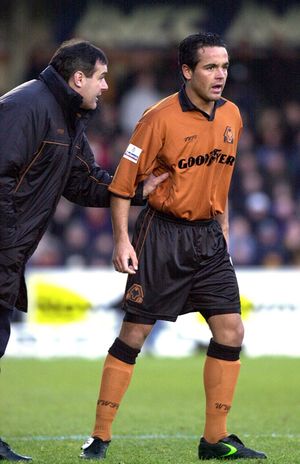
Because in the early years of his career, after a fairly spectacular breakthrough for both club and country, he openly admits he didn’t quite live a life befitting that of a professional footballer.
“I enjoyed it all too much,” admits a refreshingly honest Green.
“Drinking and partying held me back and, even if it was a different time then, and players would go out more than now, I went over the top.
“The game has changed now, and players are proper athletes, keeping themselves in great condition.
“But for me, if I wasn’t in the first team, I’d be out five or six nights a week.
“If it wasn’t Wolverhampton, it would be Birmingham, if it wasn’t Birmingham it would be that Shopping Centre towards Dudley, the Waterfront, that’s it.
“Whenever there was a night out, I was there.
“Don’t get me wrong, I was certainly enjoying myself, but if I had behaved a bit differently, I think I could have been a Championship player for much of my career.”
Green is being hard on himself but sees no reason not to be. It was perhaps only for parts of the second half of his playing career that he feels he got himself “sorted out” and operating consistently at a level in line with his potential and ability.
And that ability was considerable.
Back in June of 1998, at just 17 years and 225 days old, he became Wales’ youngest ever player. Five months later he made his Wolves debut, in a win against Sheffield United at Molineux.
And all this came from some fairly difficult beginnings.
Growing up in Fairwater in Cardiff, Green acknowledges he wasn’t the model student, and yet, in a roundabout way, that is what helped secure his move to Wolves Academy having just turned 15.
“I was getting in a lot of trouble growing up,” he explains.
“Getting into trouble at school, not turning up, fighting, getting in trouble with the Police.
“But I was doing o-k at football and had been to a few clubs on trial and I knew Wolves were interested.
“Chris Evans, who was in charge of the Academy at the time, had actually played non-league football with my Dad, so I knew him before I came to Wolves.
“And when I came on trial, Wolves were the best by a mile to be honest.
“They treated me really well, the pitches were great and so was everything about the training, I had no doubt at all about wanting to join.
“It was because of everything I was getting involved with back home that my Mum told me I had to go to Wolverhampton to get away from it all.
“Wolves had said I could join up early, before my scholarship kicked in, so I went at 15 and, while it was tough at first, it all worked out well in the end.
“At the start I still had my fighting head on a little bit, all the football banter was new to me, and I was in a different city, away from home and away from my family.
“I was probably a little bit homesick if I’m honest, but the following pre-season, when all my team-mates arrived, that was when I properly settled and started to really love it.”
Those Academy team-mates including the likes of Matt Murray, Jermaine Easter, the Clarke twins Matt and Chris, Keith Andrews and Adam Proudlock.
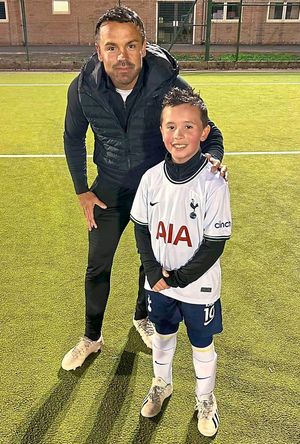
Several went on to enjoy careers and some at the top level, but none burst onto the scene as quickly and with as much fanfare as the precocious Green.
It is 25 years ago last month that he signed his first professional contract at Wolves, and at the end of that season, before he had even appeared in a senior matchday squad, he was making Welsh international history.
Manager Bobby Gould, himself a former Wolves player, selected Green for two fixtures, a 3-0 win over Malta followed by a 4-0 defeat against Tunisia.
Becoming his country’s youngest ever player broke the record held then by Ryan Giggs, and amongst those to have grabbed that particular baton since have been Gareth Bale.
Illustrious company, even if Giggs would later denounce Green’s achievement as a ‘typical Gould stunt’.
For the man himself, it was anything but.
“It was an end of season tour, the time when a lot of countries, not just Wales, often give young players a chance,” Green responds.
“It was an opportunity that I wanted to grab with both hands.
“Was it a shock? Possibly not as much as the shock when I had got myself into the Wales Under-21 team just before.
“A few of us younger lads had been called up and I remember doing really well in a game against Italy and not long after getting that chance with the senior team.
“I was very confident at that stage, even though I was only 17.
“I felt like nothing was stopping me, whether it was with the Wolves reserves, training with the first team or Wales Under-21s, I wasn’t nervous at all.”
The illustrious company extended to some of his team-mates across those two fixtures.
Craig Bellamy made his first Wales start against Malta, also scoring his first goal, and others involved included Gary Speed, Chris Coleman, John Hartson, Dean Saunders and keeper Paul Jones.
“The older lads were great with me, Gary Speed in particular, and that’s why I think Wales have gone on to do so well more recently, the togetherness in the squad with the experienced lads helping the younger ones.
“It’s an unbelievable stat to have been the youngest to have played at that time and even just to have represented my country at that age.
“It was such a great experience and one I will never forget.”
Another experience Green definitely won’t forget is his Wolves debut.
Former Wolves assistant Colin Lee had just marked taking the managerial reins with a 6-1 win at Bristol City, but injury to Kevin Muscat forced a change for the midweek follow-up at home to Sheffield United.
That opened the door for Green, who had just turned 18, and he answered the call with an impressive performance in a 2-1 win, although sadly suffered a knee injury just after the hour mark to bring a premature end to his debut.
“Again, I had no fear going into that game, that’s the kind of lad I was back then, and I just wanted to go out and enjoy it,” he recalls.
“My debut for Wolves is probably the best moment I have ever experienced walking out at a stadium.
“Coming out to the music - which I think they will still play now - under the floodlights with over 20,000 there, all the noise from the fans, that is what I had trained my whole life for.
“It was another amazing night and, even with the disappointment of the injury, it’s one that I will always fondly remember.”
The injury, to Green’s medial knee ligaments, proved particularly troublesome as he was brought back too early and suffered a reoccurrence, ruling him out until returning to Wolves’ first team fold almost two years later.
He did then manage to become a regular feature in chalking up a further 11 appearances, including a red card in a Black Country Derby at The Hawthorns for two yellows, one of which he feels was unjust.
He came on as a substitute for Dave Jones’s first game at the helm, an FA Cup win at Nottingham Forest, but ultimately the changing of the managerial guard was to signal the end for Green’s time at Molineux.
His departure, which followed a couple of transfer requests when frustrated at the lack of opportunities, came with a hint of regret at perhaps not making the most of his chance, albeit regret which perhaps only filtered through in more later years.
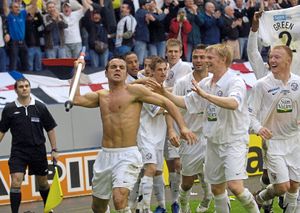
“I think when Dave came in it soon became clear that my time was up,” says Green.
“There were midfielders and centre halves playing at right back and Dave was going for senior players and treating us young lads very differently.
“But he went on and did well at Wolves and led the team to promotion so fair play to him.
“I knew it was time to get a new club and I have to say I do wish I had done things differently at that time.
“I wish someone had sat me down and had a proper chat with me, given me a stern telling off really, suggesting I didn’t go out drinking all the time.
“I know I have only got myself to blame, and I was young and away from home enjoying the parties and the nightclubs, but I wonder what might have happened if someone had just told me to go and spend a bit more time staying in.
“It’s probably part and parcel of growing up, that is when you make a lot of mistakes, and it’s something I have regretted more the older I have become but I still loved so much of my time at Wolves.”
If Jones’s arrival at Molineux proved the end of the road for Green, the managers he had previously worked for were more than sufficiently impressed to employ him again.
Lee took him on loan to Torquay, where he helped the team avoid relegation to the Conference, and then Mark McGhee signed him permanently for Millwall, where he enjoyed a run in the side before the return of Player of the Season Matt Lawrence as the Lions reached the Championship play-offs.
There followed brief stays with hometown club Cardiff and Sheffield Wednesday, before, in the summer of 2003, he found himself out of work, and no sniff of any interest.
Football, however, works in mysterious ways, and Green’s former Wolves Academy team-mate Matt Clarke’s departure from Hereford United opened up a gap which needed filling.
Another former Wolves manager, Graham Turner, snapped him up and, for Green, it was the start of several spells with the Bulls, both inside and outside of the Football League, which yielded almost 400 appearances and plenty of highlights.
Perhaps most famously he notched the late winner in the play-off final against Morecambe at Leicester’s King Power Stadium, helping Hereford back into the Football League after two successive semi-final exits.
After a spell with Bristol Rovers, including another promotion via the play-offs this time from League Two to League One, he later returned to Hereford, and after then heading to various outposts in the League of Wales, he was back in non-league with the ‘new’ Hereford, the club which rose out of the demise of the Bulls.
Whilst there, Green was part of a team which enjoyed three successive titles, and made his second Wembley appearance following Rovers’ play-off success against Shrewsbury in an FA Vase Final defeat against Morpeth.
“Going to Hereford that first time was where I finally sorted myself out for a bit,” Green explains.
“After Sheffield Wednesday I had zero interest at all – normally you might get a few clubs interested but the phone just wasn’t ringing.
“I saw there might be an opportunity with the right back position and asked my agent to get in touch and from there I managed to get myself in.
“Hereford wasn’t too far from where I was living and while it was very different to the likes of Wolves and Sheffield Wednesday in terms of facilities, what a fantastic club it was in terms of the fans.
“I think my reputation had been tarnished by stuff from earlier in my career but at Hereford I was playing week-in, week-out and have some great memories from some of the experiences at the club.
“And Graham Turner was probably the best manager I ever played for.
“He didn’t say much but when he said something it always made sense and always meant you would be ready to listen.”
There was a blip whilst at Rovers when the breakdown of a relationship saw Green return to the party scene which included sustaining a broken jaw in an incident on a night out.
But meeting new partner Hannah, now his wife, and starting a family, has settled Green down again and helped him continue his football, in non-league with Westfields where he had moved into the centre of defence up until hanging up the boots a few months ago.
While he’s not playing, he is still very much watching football whenever he can, which will also see him glued to the television screen for the forthcoming World Cup.
As a proud and once-record breaking Welshman who has spent chunks of his career in England, he’d like both the Red Dragons and Three Lions to make progress from Group B, but ultimately of course, his overall affinity has to lie with Wales.
From his own point of view, family life is now a major priority but when it comes to work, he is enjoying the mix of the coaching with Ross Juniors and working with an agency which links up with local authorities to support vulnerable young people.
“That’s for a couple of days a week, helping and supporting vulnerable youngsters who get into trouble with the Police and are at risk of getting involved in knife crime,” he explains.
“It’s about trying to get them back on the straight and narrow.
“Even though I didn’t get involved in knife crime, with some of the other stuff I can see a bit of myself in them, which means I am in a decent position to try and help them.
“It feels like I’m heading into the next chapter of my life and being able to give something back is a nice feeling to have.”
Green certainly enjoyed a more than decent playing career and the various accolades enjoyed for club and country are to be treasured and can never be taken away from him.
Could it have been better? Absolutely. And he’s the first to admit it.
But it is only through experiences and going through life’s highs and lows that he has been able to move forward, and there is a sense that putting all that knowledge into his work with young people, on and off the football pitch, Green has found a new sense of both comfort and purpose.
His Friday and Saturday nights may be very different now, but he wouldn’t want it any other way.

